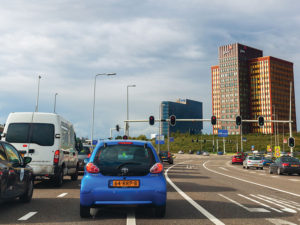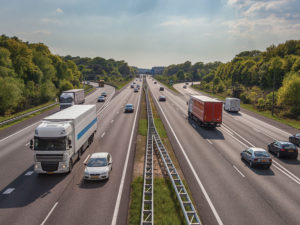Fleet Focus: Belgium
Autorola Belux director Erwin Coesens discusses the end of a love affair with diesel – and why fleets are moving to a one-stop shop approach.

Autorola Belux director Erwin Coesens
Like many countries, the Netherlands is seeing its motoring landscape change as the hunger to reduce emissions and drivers’ reliance on fossil fuels increases. 2016 was the biggest year for change as the country decided to replicate countries such as Norway, where the introduction of incentives has helped speed up the sale of electric vehicles. The government has set a target for half of new car sales by 2025 to be electric – or hybrid – powered as part of a green deal.
After decades of diesel dominance, the Belgian market has virtually switched its allegiances overnight. Government fiscal reform has included lower registration and road tax for petrols, hybrids and EVs, plus an equalisation at the pumps of the price of diesel and petrol fuel.
For companies, the more environmentally friendly the car, the more it is tax deductible and the lower the employees’ company car tax. All of these changes have been introduced to help reduce the use of fossil fuels and to help improve air quality.
Quick turnaround
 For many years Belgium was nearly 95% in favour of diesels based on their fuel consumption, reliability and strong running costs. This has changed very quickly with car makers now offering a strong range of petrol, hybrid and EV options that are finding favour with both consumers and company motorists.
For many years Belgium was nearly 95% in favour of diesels based on their fuel consumption, reliability and strong running costs. This has changed very quickly with car makers now offering a strong range of petrol, hybrid and EV options that are finding favour with both consumers and company motorists.
Volkswagen continues to be the market leader but the move away from diesel seems to have increased the fortunes for the premium brands with BMW and Mercedes both growing their market shares.
The Belgian new car market is up by 3% to 395,000 units to the end of August helped by the growth in personal leasing. Some leasing companies and national sales companies are offering leasing directly to the consumer supported by strong discounts from car makers for bulk purchases. An Opel Corsa can be leased for as little as €180 a month on a full operating lease or a Peugeot 208 for as little as €139 a month. And while profitability of these deals is sometimes in question it is helping the market keep new car sales moving forward.
The death of diesel demand
The biggest challenge for the industry is that consumers now want to only buy used petrol cars. When the Government introduced its new green road policy it affected cars already on the road as well as new cars. As a result, private motorists have been moving towards petrol power as a healthy volume of hybrids and EVs is yet to reach the market.
 Our used car traders and franchised dealers are desperately looking to buy used petrols to satisfy demand. Consumers are willing to pay more for petrols, while used diesels have fallen in price. There simply aren’t enough petrols to go around, and there won’t be for another two to three years until the large number of used diesels are flushed out of the system.
Our used car traders and franchised dealers are desperately looking to buy used petrols to satisfy demand. Consumers are willing to pay more for petrols, while used diesels have fallen in price. There simply aren’t enough petrols to go around, and there won’t be for another two to three years until the large number of used diesels are flushed out of the system.
The result is that thousands of used petrols are being imported through Autorola’s online portal into Belgium. This so called cross border activity is helping go some way to balancing demand and supply.
Changing business model
Leasing companies and national sales companies are also changing the way they manage their vehicles by switching to a one stop shop supplier, such as Autorola, to take care of their assets. Autorola has seen growth for its Fleet Monitor product, which manages a car from its inception in the factory to the day it is sold online.
Companies including JLR and Mazda have extended this one step further with Autorola now running the tender process for the refurbishment of ex-company cars and rental cars. The work is offered to authorised bodyshops and the most competitive price wins the repair contract. The refurb process is vitally important as these cars are being offered to dealers in a ready to retail condition as far as six months before they are due to come back to the manufacturer.
 This pre-selling process is being offered through Autorola’s ‘branded sites’ initiative where dealers get to bid on OEM stock in a closed auction environment. The dealer can bid on stock and a final defleet inspection by Autorola means the price the dealer pays is modified slightly depending on the car’s end of contract mileage and condition.
This pre-selling process is being offered through Autorola’s ‘branded sites’ initiative where dealers get to bid on OEM stock in a closed auction environment. The dealer can bid on stock and a final defleet inspection by Autorola means the price the dealer pays is modified slightly depending on the car’s end of contract mileage and condition.
By selling used cars so early on in their life on a buyback agreement with a rental or leasing company the manufacturer is managing their assets more efficiently. They know what pipeline of used stock they have sold and what cars they can then offer to the wider market. This approach is proving very successful and is a dream come true for many remarketing strategists who have been talking about this approach for many years. Now this has become reality.
Belgian economics
A month-on-month comparison shows that industrial production in Belgium rose a seasonally-adjusted 1.1% in June, contrasting May’s revised 0.4% rise (previously reported: -1.7%) and the fastest monthly expansion in four months. The increase was driven by higher output in the manufacturing and electricity, gas, steam and air conditioning sub-sectors, which more than offset lower output in the mining and quarrying sub-sector.
Annual average growth in industrial production decreased from 3.7% in May to 3.4% in June. FocusEconomics Consensus Forecast panelists expect industrial output to expand 2.3% in 2017, which is down 0.1 percentage points from last month’s forecast. For 2018, the panel sees industrial production growth rising slightly to 2.6%.
The economy plodded along at a mild pace in Q2, according to recently-released figures. Robust domestic demand likely fueled growth, with consumer spending aided by lower inflation, and fixed investment buoyed by easy access to credit and past structural reforms designed to boost firms’ profitability. In a bid to raise the potential growth rate and make Belgium a more attractive place to do business, at the end of July the federal government reached an agreement on an important battery of reforms. The corporate tax rate will be reduced significantly by 2020, measures to increase the flexibility of the jobs market and reduce labour costs will be implemented, and the fiscal stance will be tightened in 2018 in order to chip away at the large public debt burden.
 Growth is set to remain modest going forward, with fixed investment supported by easy access to credit, and exports continuing to grow healthily thanks to firms’ improved competitiveness and solid regional dynamics. However, long-run growth potential continues to be hampered by low labour market participation. FocusEconomics panelists expect GDP to expand 1.6% in both 2017 and 2018.
Growth is set to remain modest going forward, with fixed investment supported by easy access to credit, and exports continuing to grow healthily thanks to firms’ improved competitiveness and solid regional dynamics. However, long-run growth potential continues to be hampered by low labour market participation. FocusEconomics panelists expect GDP to expand 1.6% in both 2017 and 2018.
Business confidence fell from minus 1.5% in July to minus 2.1% in August. The decrease in the barometer resulted from worsening sentiment in the business-related services, building and trade industries, which more than offset improving sentiment in the manufacturing industry.
Consumer confidence was unchanged in August from July’s 2.0 points, which marked the highest reading since the pre-crisis peak in 2007. Consumers grew more optimistic regarding the country’s economic situation and unemployment, while they became less positive concerning their financial situation and ability to save.
FocusEconomics Consensus Forecast panelists expect fixed investment to expand 2.6% in 2017, which is down 0.4 percentage points from last month’s projection. For 2018, the panel sees fixed investment growing 2.4%. The panelists expect private consumption to expand 1.5% in 2017, which is up 0.1 percentage points from last month’s estimate. For 2018, the panel expects private consumption to grow 1.4%.

